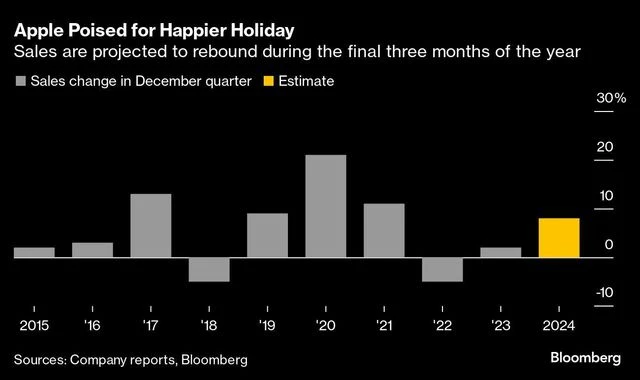)
Apple is launching the iPhone 16 lineup today in nearly 60 countries, including the United States, China, India, Australia and South Korea. Image: Bloomberg
Apple Inc. faces an unprecedented challenge: persuading customers to buy its latest iPhones without their biggest new features.
Apple on Friday launched the iPhone 16 lineup in nearly 60 countries, including the United States, China, India, Australia and South Korea. But the device won’t come with Apple Intelligence, the long-awaited artificial intelligence software the company has been touting since June. That means users will have to download the software’s features over time, as they become available in the coming weeks and months.
Apple finds itself in a tricky situation. The company is already touting its AI features, but some consumers may be hesitant to buy the new phones if they can’t take advantage of them right away. The new iPhone’s hardware, meanwhile, features only modest improvements over previous models. The most notable change is the touch-sensitive camera control button that makes it easier to take photos and videos.
Still, Wall Street remains optimistic that Apple will be able to accelerate its growth during the crucial holiday season. Analysts expect revenue to rise 8% in the December quarter, the best result for that period since the end of calendar 2021.
)
The new lineup includes two standard models, the 16 and 16 Plus, as well as the top-of-the-line Pro and Pro Max models. Pre-orders for the devices began last week, and shipments to stores and customers began Friday.
It’s rare to see huge crowds of iPhone buyers at Apple stores these days, but some die-hard fans have been lining up at stores around the world. The big question will be whether ordinary consumers will snap up the new model as well.
The first units to go on sale will run the iOS 18 operating system, but Apple Intelligence will require an over-the-air software update to iOS 18.1, which will be released in October.
Apple Intelligence was announced in June at the company’s Worldwide Developers Conference and has been available in a limited beta to developers for several weeks.
On Thursday, Apple released a public beta of Apple Intelligence, aimed at a broader audience, but most customers won’t have access to it until the feature suite is released in its final form next month. Additional features won’t be ready until later, in a staggered rollout that will stretch over the next year.
When the tech giant introduced the iPhone 16 lineup, it said these devices were the first to be designed “from the ground up” for Apple Intelligence. But some of last year’s iPhones — the 15 Pro and Pro Max — will also be able to support these features.
The new phones look little different than 2020’s iPhone 12. But they do feature notable improvements in battery life and cameras beyond the new button. Prices start at $799 for the standard iPhone, up to $1,199 for the Pro Max.
In recent years, consumers ordering phones from Apple’s online store have faced significant shipping delays, a sign that supply wasn’t meeting demand. This year, that problem has eased, either because orders are slower or because Apple simply has more phones in stock.
New orders for the regular iPhone 16 models will ship in early October, while the Pro versions will arrive around the middle of the month.
Apple also unveiled entry-level AirPods and updated watches this month. The new earbuds, dubbed AirPods 4, come in $129 and $179 versions, with the latter model including noise cancellation. That feature was previously reserved for the top-of-the-line AirPods Pro, which cost $249.
Apple’s latest smartwatches, meanwhile, don’t offer a major reason to upgrade. The new Series 10 has a larger display and a thinner design, but otherwise resembles the Series 9. The only change the company is making to the top-of-the-line Ultra model, meanwhile, is a black color option. Still, the products could appeal to customers who have older Apple Watches or are new to the category.
The iPhone, watches, and AirPods won’t be the last new Apple products of 2024. The company is also planning a major overhaul of the Mac computer later this year.
Apple will bring its AI-focused M4 processor from the iPad to MacBook Pro laptops and iMac desktops. The company is also preparing the most significant redesign of the Mac mini in the product’s two-decade history, with a smaller design and new chips.
First published: September 20, 2024 | 8:14 a.m. IST


